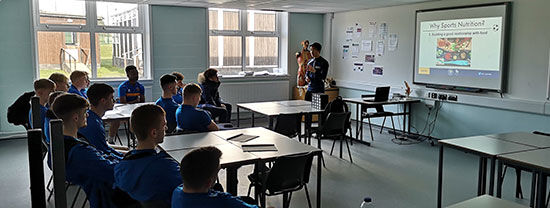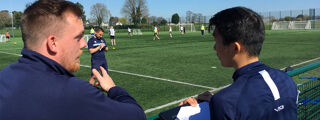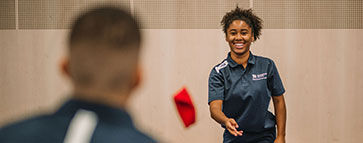Sport and Exercise Nutrition student, Wee Lun Foo shares his experience of securing placements at Shrewsbury FC and Birmingham Swimming in his second year on the course and how they helped to boost his skills and confidence.
How did you secure your placements?
The Sport and Exercise department has great links with the sports industry and provided the contacts for both Shrewsbury Town FC and Birmingham Swimming.
I approached both organisations by email with my CV and a cover letter of what I have to offer. I was then invited by both clubs for an initial interview to discuss my potential role and my availability during a normal week. I think being passionate while also being realistic during those initial meetings helped me to successfully secure my placements at both of the clubs.
How do you fit them in alongside your course?
I usually go into both clubs twice a week when there’s few or no scheduled lectures. Being productive is very important to me, therefore I utilise my free time (on the train to Shrewsbury, weekends, out of lecture hours) efficiently in order to complete my academic assignment and work from the placements to a high standard.
It may sound daunting to someone to work during weekends or in your spare time, but this is common in applied sports nutrition settings. Things were easier for me as I thoroughly enjoy every moment during my placement whether I am on or off site.
Visit us at our next Open Day
This is the perfect opportunity to chat to our staff and students, and check out our state-of-the-art facilities.
What is a day on placement usually like?
On a normal training day, I will take a train from Birmingham to Shrewsbury at 7am. After arriving at Shrewsbury train station, Mike Wilson, the Academy Administration and Logistics Officer will pick me up alongside the players in a mini-bus. This is always a great opportunity to get to know more about the players and build a good relationship with them. On arrival in Shrewsbury Sports Village (their training ground) around 9am, I will either schedule one-to-one consultations with the players to discuss their own individual diet plan, conduct body composition assessments (skin fold testing) or conduct education workshops before they start their training at 10.30am.
When the team is training, I spend time completing producing reports for the coaches, creating individual diet plans, analysing food diaries etc. Sometimes, I will observe their training to get a better understanding of their training intensity and the nutritional demands needed to support the training, which is also another great opportunity for me to build relationships with the players.

It is slightly different with the City of Birmingham Swimming Club as their training session generally last about three hours including the land training. Therefore, my time with them will vary depending on the day I attend. Every Thursday there is a one hour nutrition workshop, which will either be group education or practical meal planning. The one-to-one consultation will normally be scheduled during their land training or sometimes the coaches will allow them to finish their pool training earlier to allow time for me to talk to the swimmers.
What skills have you learnt from your placements?
One of the most important skills I have learnt is the ability to facilitate behaviour change. Human behaviour is complex and we often don’t act rationally especially when it comes to food choices. Therefore, it is very important for me to be empathetic and think from the athletes’ perspective, in order to create a nutrition plan that the players can execute with ease.
Reflection is another key skill that I have learnt during my placements. My ability to reflect before, during or after an action has helped me to better understand why I do what I do and allow me to improve my capabilities in bridging the gap between science and practice.
Last but not least, my time management skill has improved significantly. I am now better in managing procrastination and finding the balance between work and life.
What has been your best/worst thing about placement?
My favourite thing is watching the teams perform well during competitions as it provides me with a sense of achievement. However, my worst thing is if they don't perform well during competitions because I know how much effort they put in during training and I will self-criticise to see how I can improve their performance, although I know nutrition is not a sole factor that determines performance.
How do you think these experiences will benefit you in future?
I hope that these placement opportunities will massively benefit me when it comes to applying for jobs or study application as it demonstrates my ability to translate science and theory into practice. I have been able to broaden my network by getting to know more people in applied sport which might also help me to secure a job in future. Finally, I feel that these placements have boosted my self-confidence and may help me to settle into a club if I secured a job in elite sport.


